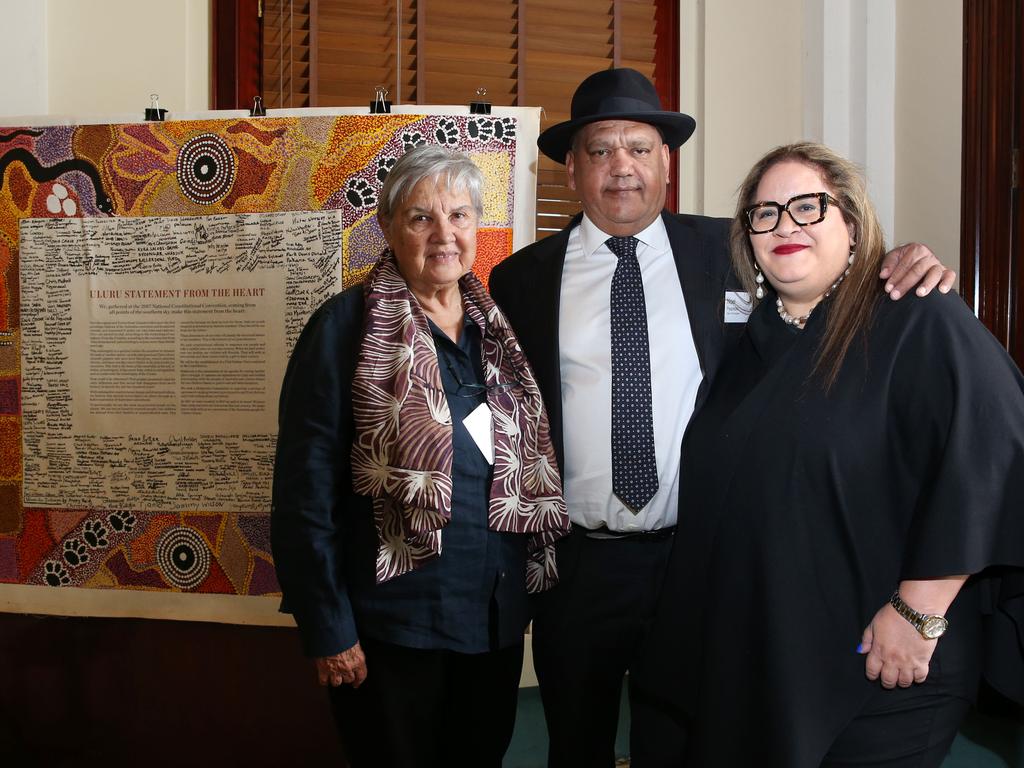Support for Indigenous voice grows stronger

The occasion was the latest in a series of events to launch Buraadja, NSW senator Andrew Bragg’s impressive history of conservative innovation and leadership in Indigenous affairs, and its argument for constitutional recognition in the form proposed by Indigenous people themselves through the Uluru statement.
At two other launches organised by the senator and his publishers around the country, sympathetic sentiments also were expressed by Indigenous Australians Minister Ken Wyatt and South Australian Premier Steven Marshall. A fourth event, scheduled to take place in Melbourne before the city headed into its latest lockdown, was to hear from Josh Frydenberg.
Perhaps even more telling than the line-up of Liberal influencers at the launches is the fact the foreword to Buraadja was contributed by Scott Morrison.
While the Prime Minister doesn’t refer specifically to the Indigenous voice or even constitutional recognition in his remarks, it is inconceivable that he would have involved himself in the project if he wasn’t open to the ideas presented in the book.
Speaking at the Sydney Institute last week, Bragg said he had been encouraged by colleagues in the Liberal Party to pursue this project, including by those who haven’t supported his position previously. “Australian liberalism has delivered its share of contribution to Indigenous policy,” he said. “There has been good and bad, but we should remember the good to ensure that the ambition remains alive in the present when we consider proposals like the Uluru statement.”

Noel Pearson, who accepted this year’s Sydney Peace Prize for the Uluru Statement from the Heart, alongside his fellow Referendum Council members Pat Anderson and Megan Davis, has long argued that political conservatives are most likely to achieve meaningful recognition of Aboriginal and Torres Strait Islander people.
In 2004, he said: “Only a highly conservative leader, one who enjoys the confidence of the most conservative sections of the national community, will be able to lead the country to an appropriate resolution.” It was also Pearson who pointed out in this newspaper a few weeks ago that John Howard was the first Australian prime minister to use the word recognition. It appeared in a speech titled The Right Time: Constitutional Recognition for Indigenous Australians, which Howard delivered on the eve of the 2007 federal election.
In giving the speech that committed him, if re-elected, to holding a referendum to formally recognise Indigenous Australians in the Constitution, Howard – ever the pragmatic politician – admitted he had changed his mind on the issue.
Acknowledging that “this whole area is one I have struggled with during the entire time that I have been prime minister”, he concluded: “As always, the Australian people themselves are the best guide.”
I’ve been intimately involved in the journey towards constitutional recognition for more than a decade, mindful of every nuance of the debate, and my antenna tells me the Australian people are amassing in force behind the Indigenous voice.
Take corporate Australia, more sensitive these days to the expectations of stakeholders beyond their shareholders. Business Council of Australia president Tim Reed recently told a who’s who of corporate heavyweights, gathered in support of the From the Heart campaign, the BCA supported the Uluru statement and its call for a constitutionally enshrined voice to parliament.
The momentum I am observing encompasses the trade union movement; law societies; welfare organisations (the Australian Council of Social Service, Australian Red Cross and St Vincent de Paul Society, among many others); the Australian Medical Association; numerous branches of the Country Women’s Association; Christian, Jewish and Muslim organisations; and schools and universities.
And that’s just scratching the surface of a level of support that isn’t static – month by month, even day by day, I am hearing or reading new declarations of support and calls on the government to respond. What other cause on our national agenda right now has garnered this voltage of people power? Climate change, perhaps, but I can think of no other.
The findings of recent research commissioned by Reconciliation Australia support my thesis. The 2020 Australian Reconciliation Barometer found 86 per cent of the general community and 91 per cent of Aborigines and Torres Strait Islanders backed the establishment of a representative body that gave Indigenous Australians a say in matters that affected them. Eighty-one per cent of the general community and 88 per cent of Aborigines and Torres Strait Islanders believed it was important to protect such a body with constitutional validation.
Even the most intransigent politician understands that listening is part of their remit. And it is my firm belief, once the referendum show is on the road, political leaders across the spectrum will own it and champion it.
When you consider the intensity of support this cause has generated ahead of what will soon become a lock-step bipartisan Yes campaign, the remarkable success of the 1967 referendum may yet be achieved for a second time in Australia’s history. How often does a nation get the opportunity to embrace something so reasonable, so non-threatening, that will be a source of great pride for present and future generations of Australians?
Mark Leibler is senior partner at Arnold Bloch Leibler and co-chaired the expert panel and the Referendum Council on Constitutional Recognition of Aboriginal and Torres Strait Islander Australians.





When NSW Premier Gladys Berejiklian stood up last week and described the Uluru Statement from the Heart as “a vehicle both to address Indigenous recognition and make our nation better”, the momentum behind a constitutionally protected Indigenous advisory body became near irresistible.